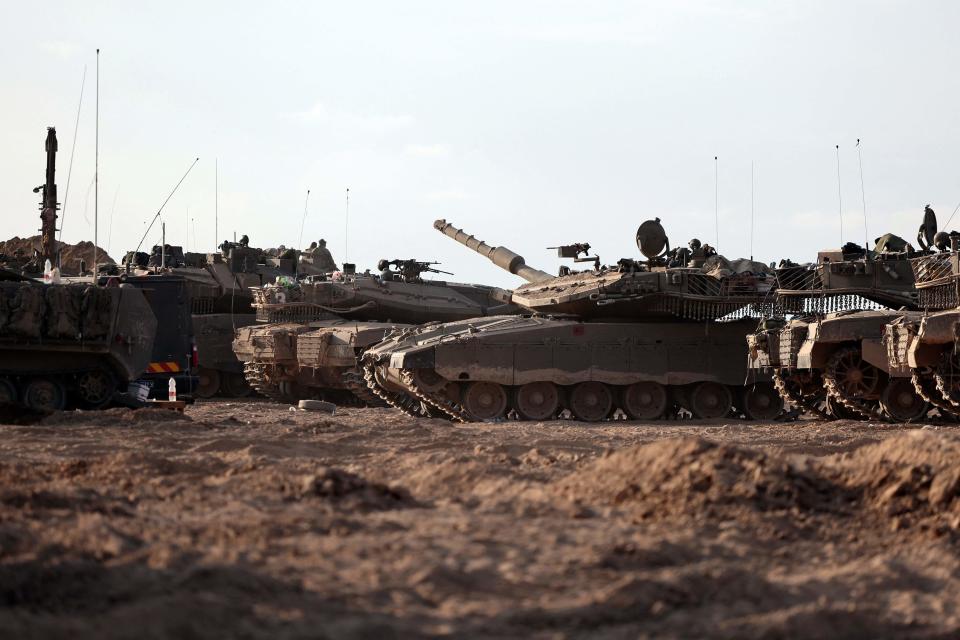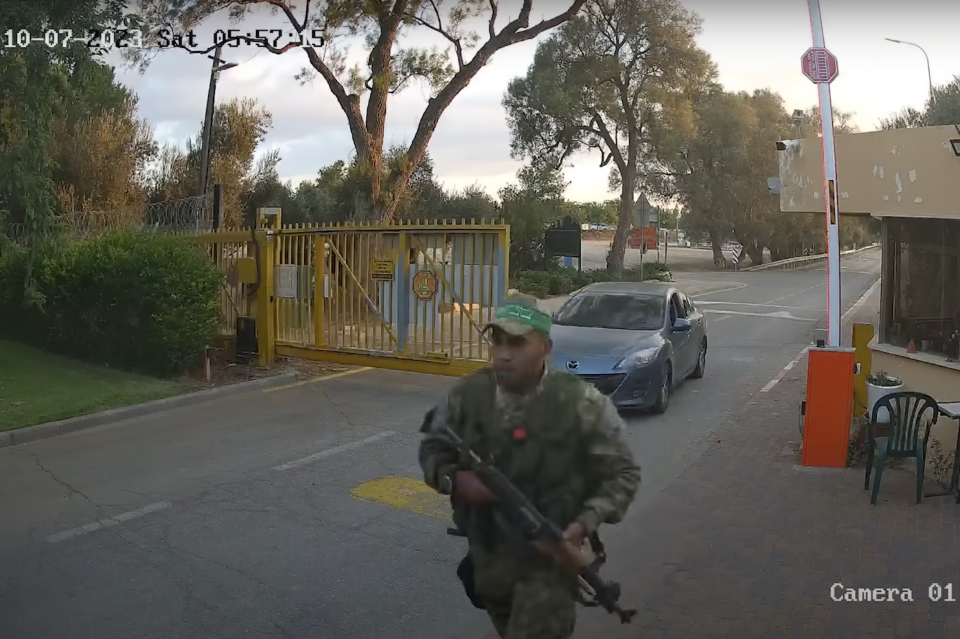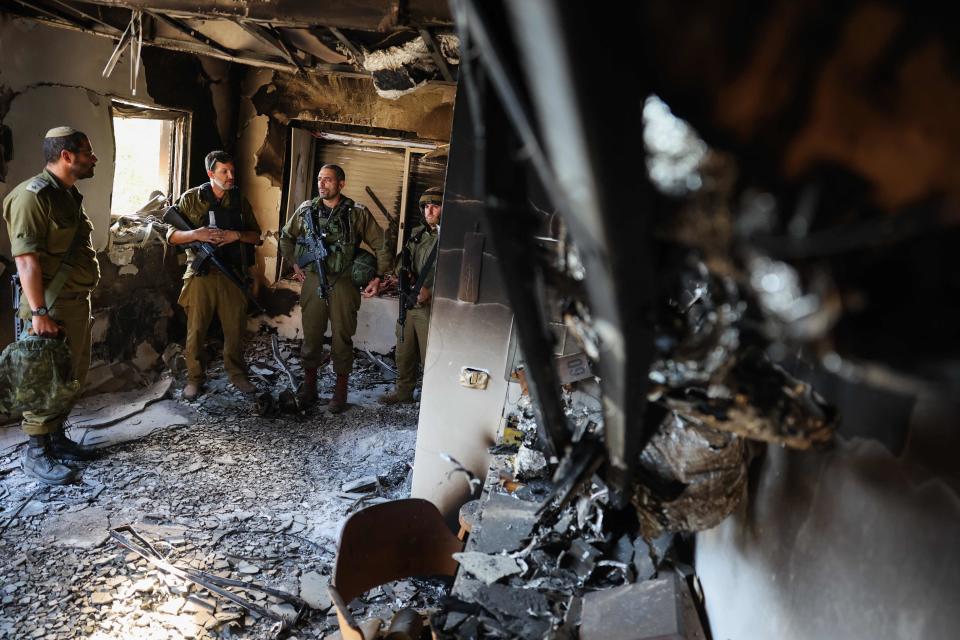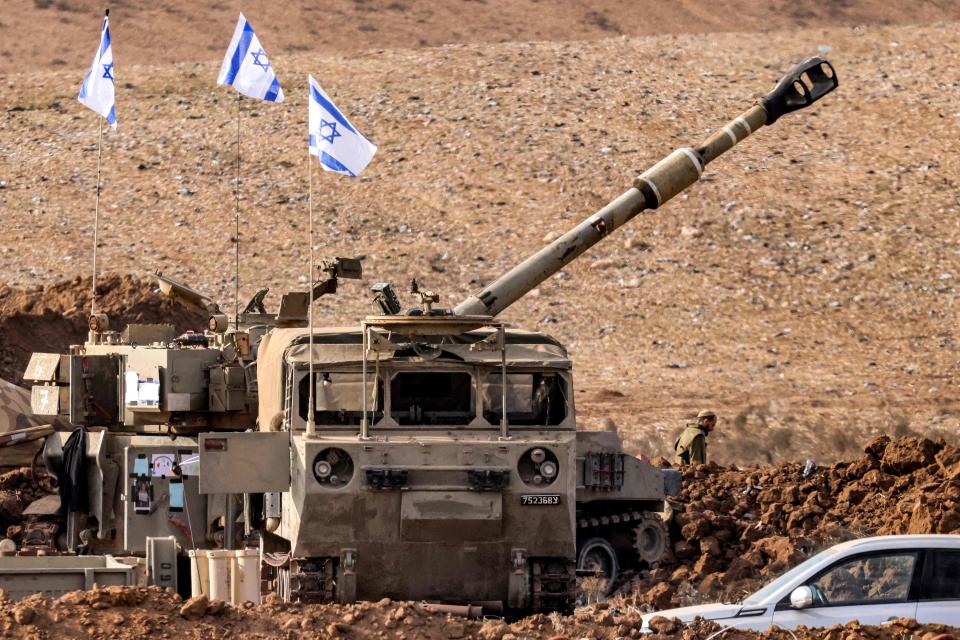They survived Hamas’ attack when many didn’t. Why they shared their stories with Delaware
The Oct. 7 sunrise over Re’im was majestic.
From a makeshift encampment in Israel’s Negev desert, attendees of the Supernova music festival watched as the morning light drove away the night’s darkness. Peering through trees and tent canopies, they took in the sky’s deep red, which slowly transformed to pink.
Then came the booms.
At first, some thought the noise was music, an early-morning start to the day’s celebration, said Yael Simon, a festival attendee. But quickly, the rockets became visible.
As the missiles flew through the desert air, few panicked. Growing up in Israel, and especially on the border with Gaza, many are used to the sound, Simon said. Israelis trust the Iron Dome – the country’s air defense system – to do its job.
It soon became apparent, however, that this wasn’t a typical rocket attack.
The missiles, Simon told a group of community members at the Siegel Jewish Community Center in Talleyville Friday afternoon, felt “really, really close.” This prompted the 28-year-old and her friends to head toward their car. They had decided to leave the festival and make their way to a safer area.
Their plan didn’t pan out.

As they drove toward the festival exit, Hamas militants surrounded attendees who were similarly trying to escape. Soon, gunfire erupted near the car.
Simon and her friends had two options: Remain trapped in the vehicle or run. They chose the latter.
A thin but athletic woman with medium-length dark hair, Simon is one of the luckier ones.
That morning, more than 350 men and women were massacred at the Supernova and Psyduck festivals near Re’im, a kibbutz less than 4 miles from the Gaza border, officials said last month.
Initially, around 260 people were thought to have died at those locations. About 1,000 others were killed in different locales as Hamas militants ravaged Israeli communities, raping, murdering and kidnapping those in their path.
While Oct. 7 marked the deadliest day for Jews since the Holocaust, prompting Israel to declare war on Hamas, hundreds more managed to escape alive that day. In recent weeks, they've begun sharing their stories.
This weekend, four of them, including Simon, spoke in Delaware.
Presented by the JCC Association of North America in conjunction with two Israeli organizations, the events were a continuation of a Holocaust-associated phrase-turned-call-to-action: Never Again.
Though these words were used before WWII, in the decades since, they’ve become symbolic of the Jewish commitment to remembering the Holocaust, in particular by survivors sharing their stories to prevent another similar event.
The goal for the Oct. 7 survivors, who in total spent a week in the Delmarva area, was the same: Tell their stories to combat what Sharon Ana Yakobi, who escaped but who had friends murdered – including one who was burned alive – called “the short memory of people.”
“We never had a chance on that Shabbat,” she said. “They just went through and just started to butcher people. And people forget about it.”
Saturday, Oct. 7, around 6:30 a.m., several miles north of the festival
Yakobi and her husband were asleep in their home a few miles north of the festival when their 8 ½-year-old daughter came into their room. She likes to cuddle with them on weekend mornings, Yakobi said, and had planned to do the same that day.
As the couple dozed off, their daughter roused them – there was a red alert, she said, meaning rockets or mortars were being launched into the country.
“There is no alarm, to go back to sleep,” Yakobi remembers telling the girl.
Less than a minute later though, she heard a familiar whistle and the two distinct clicks of a defense missile being launched. She knew it came from Iron Dome infrastructure located behind their kibbutz.
Quickly, Yakobi and her husband ushered their daughter and two nieces, who were visiting, into her son’s bedroom, which also serves as a safe room. The girls, not from the area, were confused.
“We tried to explain that now they're safe, the rockets are from Gaza,” Yakobi said. “Don't worry, everything will be okay.”
Be’eri kibbutz, several miles from Yakobi, also around 6:30 a.m.
Like Yakobi, 28-year-old Daniel Weiss and his 29-year-old girlfriend, Orin Bokobza, were asleep in their bedroom when the whistle of rockets woke them up.
The duo had moved from Tel Aviv to Be’eri kibbutz, where Weiss was born and raised, about two months earlier. They had friends visiting and were expecting a calm weekend after enjoying a beautiful Friday together, Weiss said.
As hundreds of Hamas missiles entered Israeli airspace that Saturday morning, Weiss and Bokobza gathered their friends in their bedroom, which served as the couple’s safe room. They quickly got in contact with Weiss’ parents, who also live in Be’eri.
“There might be terrorists in the kibbutz,” Bokobza recalled being told. Weiss’ parents stressed that they should ensure all doors and windows were locked.
After making their way through their apartment, the couple tried to lock their bedroom door and window but quickly realized neither could be secured. Then, they began hearing gunshots.
“We thought it might be maybe two or three terrorists because we heard stories like this a long time ago,” Weiss said in broken English. “Two, three and in a half an hour maybe it will end.
“But half an hour (passed) and the shooting just kept coming toward us.”
Supernova festival, near Re’im, about 8 a.m.
As Simon and her friends ran from their car, they searched for somewhere to hide.
Finding a large pipe in the ground, they used that as cover until the gunshots got too close. Then they were on the move again, alternating between running and hiding, until they eventually made their way back to the car. Simon said they were fortunate to have a Jeep, given it’s a larger vehicle.
They managed to speed out of the festival grounds, driving until they spotted a nearby Israel Defense Forces post. They'd be safe there, they thought − a sentiment shared by others who'd also managed to escape.
But they soon learned they were wrong.

As they made their way into the IDF building, they spotted militants driving toward the post. Again, they had to make a split-second decision.
Once more, they got back in the car. This time, they tried to fit as many people as they could.
"They begged for their lives," Simon said on Friday. “I’m sorry we couldn't take more."
As the group sped away, ultimately making it to a friend's apartment where they remained as rockets continued to fly overhead, they heard the attackers' gunshots.
Yakobi’s home north of the festival, soon after the attacks began
The messages came quickly.
Militants were trying to get over a fence in Yakobi’s community, a text to her phone read. One of her neighbors, who had a gun, had started shooting at the men.
Yakobi would later learn that another neighbor had run over and tried to distract the attackers by drawing attention to himself. As he did that, the commander of the kibbutz’ security also began engaging the militants.
While this small resistance may have saved the community, others fared far worse.
Yakobi, who is a teacher in Sderot – a town about 3 miles northwest of where Supernova was held – began receiving messages from her students.
SDEROT: This Israeli town was Ground Zero for the Hamas attacks
“They’re shooting here, we have terrorists trying to get inside our houses,” Yakobi recalls the messages saying.
“One of them also texted me that he's on the roof with these parents, and what should he do because the terrorist was on the first floor of his building," she added.
She replied that the family should call the police. Yakobi had no idea that Hamas had taken over the local police station, kidnapping and killing its officers.
Be’eri kibbutz, about four hours into the attack
Though Weiss and Bokobza, holed up in their safe room without working locks, tried to remain in contact with Weiss' family – in addition to his parents, the 28-year-old's brothers also live in the kibbutz – the communication from Weiss’ parents stopped around 10 a.m.
By then, the shooting had made its way nearly to the couple’s door. Weiss said he could smell the gunpowder as he, Bokobza and their friends scoured the internet for information about what was occurring.
“Where's the army?” those in hiding had posted online. “There’s terrorists in my kitchen.”
After many additional hours of waiting in darkness and silence, around 2 p.m., the group heard the loudest sounds yet: Screaming in a language they knew was not Hebrew. They held their breath as militants broke into their apartment, fearful that the smallest sound would give away their location.
Weiss, meanwhile, had stepped forward to barricade the bedroom door.
As the militants made their way into the two rooms on either side of their safe area, the group was sure they’d be found. But the attackers left after locating no easy targets, Weiss said.
He and Bokobza have no understanding of why Hamas didn’t try to access their room, especially when the apartments near them were ravaged. Bokobza called it “so lucky.”

Additional hours passed as the group waited in the room. Finally, about 10 hours after the attacks began, IDF soldiers who had made their way to the couple’s home gave the all-clear.
The group emerged cautiously and was greeted with a hellscape. Hamas had destroyed much of Be’eri, burning homes and cars and detonating explosives, the couple said.
Given the destruction − and the few survivors − there was no evacuation plan.
Ultimately, the group flagged down a bus that had brought Israeli soldiers to the area. The driver was willing to transport them and several family members whom they’d since connected with. As Weiss looked back at the community, he spotted his childhood home.
Sitting in a chair at the JCC on Friday afternoon, he recalled the scene.
“I (could) see it on fire,” he said as Bokobza interjected, emphasizing that by the time they left, they still hadn’t heard from Weiss’ parents.
“I wanted to run there and take them out," Weiss said, "but I know it (would be) a really dumb thing to do."
Instead, the group boarded the bus. As they headed toward Tel Aviv, they were met with more horror.
“There were bodies all over the place and burning everywhere – the side of the road was just on fire,” Bokobza said. “It was crazy, like a movie.”
Hours into the attack, Yakobi’s kibbutz
As the day wore on, Yakobi, still hiding in her safe room, began learning more about what was transpiring.
On WhatsApp and other social media sites, friends who live closer to the Gaza border than she posted desperate pleas for help.
“There are tons of terrorists around,” one message read.
“Send the army, send the police, send somebody to help us,” another said.
And the news only got worse.
Though Yakobi's immediate community was largely spared, she watched as Hamas tortured and killed family friends. During their attack, the U.S-designated terrorist group hijacked victims' social media accounts to livestream the atrocities.
Yakobi was one of a handful of friends and relatives who received a link to a video posted to Gali Idan's Facebook page. The woman and her family resided in Nahal Oz, a kibbutz located less than a mile from Gaza.
Once Yakobi realized what she was watching, she quickly closed the website. But it was too late: She learned that Maayan Idan, Gali's 18-year-old daughter and a volleyball player, had been shot in the head. The young woman was killed when militants tried to break into the family's safe room.
Yakobi was later told that the young woman's father, Tsachi, had been taken hostage. Gali survived.

As Yakobi remained holed up in her son's room, she felt helpless.
The messages from friends "who are having the nightmares of their life" kept rolling in. "And you cannot help them in any way," Yakobi said.
Finally, like at kibbutz Be’eri, the IDF came to her home. They had deemed the area OK to evacuate and the family could emerge.
By that point, Yakobi and her family had been in the safe room for 27 hours.
The aftermath: Simon, Weiss and Bokobza
The days following Oct. 7 passed in a blur for Simon and others with her who’d made it out of the Supernova festival alive.
The community that attends these kinds of raves, she said, is small. Attendees get to know one another “and it feels really warm,” intimate.
As survivors tried to contact the people who’d been left behind, they heard nothing. Finally, after about a week, they got word: a number of their friends had been murdered.
Weiss and Bokobza, meanwhile, were also awaiting news.
Though one of Weiss’ brothers had gotten out on Oct. 7 with his wife and children, it took a few days before the 28-year-old learned that his other brothers were safe. Even then, they knew nothing of how their parents fared.
Like Simon, the men received word after about a week: Their father, Shmulik, had been killed, the IDF told them. Their mother Yehudit, they later learned, had been taken hostage.
In Judaism, it’s customary for family members to mourn their loved ones for 30 days after burial, called shloshim. (Children mourn their parents for a year).
Just after the 30th day of their father’s funeral, Weiss and his siblings were again contacted by the IDF. Yehudit, they were told, had been located.
Her body was in Gaza, in a building adjacent to Al Shifa Hospital.
Tuesday marks the 30th day since her burial.
‘None of us have a home’
Though Simon, Yakobi, Weiss and Bokobza survived Oct. 7 when family, friends and colleagues did not, Israel is not the same for them right now.
At these talks, Yakobi wears a white shirt she received at 18-year-old Maayan's funeral. On it is printed two images: one of the young woman, with the word “murdered” below her photo.
The other image is Tsachi, the teen's father. Though Hamas released a number of hostages last month, he was not one of them.
"Bring Tsachi back" and “Kidnapped” are displayed in large letters under her photo.
Yehudit Weiss was a 65-year-old who worked with kindergarten kids.
On October 7, Yehudit was abducted by Hamas from her home in Kibbutz Be’eri. Her husband, Shmulik Weiss, was murdered in their home. Yehudit and Shmulik were parents to 5 children.
IDF soldiers recovered her… pic.twitter.com/Y7tpt8nU3o— Israel Defense Forces (@IDF) November 16, 2023
As the group heads back to Israel, they know they're lucky to be alive. But any sense of normalcy will remain elusive for a long time to come.
Hamas’ rampage left Be’eri and other kibbutzim almost unrecognizable, and the IDF says the area still isn’t safe. It’s not known when the army will allow residents to return to their homes.
In the meantime, this group − like others in the country who have been evacuated from their homes due to where Hamas and Hezbollah are launching rockets from − will be put up in hotels or stay with family and friends.
All said they're glad they could travel to the U.S. to share their stories, no matter how difficult it is to relive that day. Still, they’re apprehensive about what awaits their return.
“I can't say that we're going home, because none of us have a home,” Yakobi said. “We're going back to the war.”
Got a tip? Send to Isabel Hughes at ihughes@delawareonline.com or 302-324-2785. For all things breaking news, follow her on X at @izzihughes_
This article originally appeared on Delaware News Journal: Survivors of Hamas attack recount escape stories in Delaware

